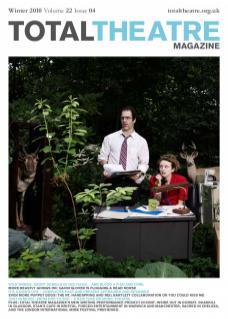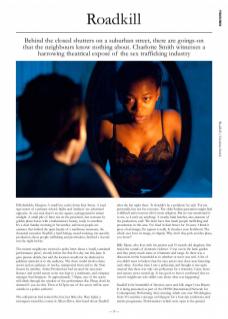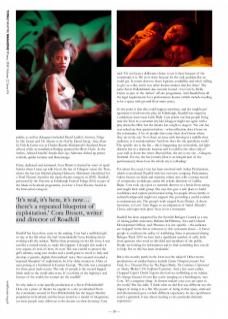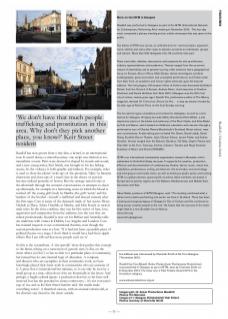Pollokshields, Glasgow. A small boy cycles down Keir Street. A road sign warns of a primary school; hijabs and ‘artifacts’ are advertised opposite. At one end, there’s an airy square, a playground in winter sunlight. A small pile of litter sits on the pavement, but overseen by golden plane leaves with a hallucinatory beauty, ready to tessellate. It’s a clear Sunday morning in November, and most people are unaware that behind the quiet façade of a sandstone tenement, the theatrical sensation Roadkill, a hard-hitting, award-winning, site-specific production about people trafficking and prostitution, finished a second run the night before.
The nearest neighbours received a polite letter about a ‘small, contained performance piece’, shortly before the first five-day run this June. It gave precise details, but said the location would not be disclosed in publicity material or to the audience. The show would involve three actors and an audience of twelve, transported from and to the Tron theatre by minibus. Ankur Productions had secured the necessary licences and would ensure noise was kept to a minimum, said company manager Suzi Simpson. ‘At approximately 7.30pm, one of the actors will climb through the window of the performance flat. Please don’t be alarmed if you see this. Then at 8.15pm one of the actors will be seen outside in a police uniform.’
The odd person had noticed the bus, but little else. Shaz Iqbal, a newsagent round the corner in Albert Drive, first heard about Roadkill after the last night there. ‘It shouldn’t be a problem,’ he said. ‘For me personally, but not for everyone. The older Indian generation might find it difficult and everyone who’s more religious. But no one mentioned it to me, so I can’t say anything.’ A nearby halal butcher, also unaware of the production, said: ‘We don’t have that much people trafficking and prostitution in this area. I’ve lived in Keir Street for 34 years. I think it gives a bad image; I’m against it really. It devalues your livelihood. The whole area loses its image, its dignity. Why don’t they pick another place, you know?’
Billy Munn, who lives with his partner and 15-month-old daughter, first heard the sounds of domestic violence. ‘I was out in the back garden and they pretty much came at it hammer and tongs. So there was a discussion in this household as to whether or not it was real. A bit of you didn’t want to believe that the nice actors next door were battering each other. Another time I saw a policeman and thought it was quite unusual that there was only one policeman for a domestic. Later, buses and camera crews turned up. It was good to have it confirmed that we weren’t neighbours who didn’t care about what was happening.’
Roadkill is the brainchild of director, actor and folk singer Cora Bissett. It is being presented as part of the IETM (International Network for Contemporary Performing Arts) meeting, which saw over 500 delegates from 35 countries converge on Glasgow for a four-day conference and artistic programme. Performances (which were open to the general public, as well as delegates) included David Leddy’s Susurrus, Trilogy by Nic Green and The Monster in the Hall by David Greig. Alma Mater by Fish & Game was at Charles Rennie Mackintosh’s Scotland Street school, while an installation Bridging spanned the River Clyde. At the Arches, Adrian Howells’ female alter ego Adrienne dished up prawn cocktail, quiche lorraine and blancmange.
Feisty, dedicated and animated, Cora Bissett is framed by rows of spirit bottles when I meet up with her in the bar of Glasgow venue the Tron, where she has just finished playing Helena in Midsummer (shortlisted for a Total Theatre Award in the music theatre category in 2009). Roadkill, presented by the Traverse at Edinburgh Festival Fringe 2010, as part of the Made in Scotland programme, won her a Total Theatre Award in the Innovation category.
Roadkill has been three years in the making. Cora had a trafficked girl to stay at her flat when she had ‘coincidentally’ been thinking about working with the subject. ‘Rather than pouncing on her life story, it was just like a mental tweak, to make this happen. I thought this makes it very urgent, it’s real, it’s here, it’s now.’ She was careful to protect the girl’s identity, using case studies and a small grant to travel to Italy and develop a ‘generic, slightly fictionalised’ story. Her research revealed a ‘repeated blueprint’ of exploitation, be it by older women in Africa or men posing as a boyfriend in Eastern Europe. ‘The title was a metaphor for these great trade routes. The sale of people is the second biggest black trade in the world after arms. If you think of the highways and byways of the world, the women are the Roadkill.’
So why make it a site-specific production at a flat in Pollokshields? How can a piece of theatre be organic to a site yet detached from the community around it? East Pollokshields has the largest Muslim population in Scotland, and has been touted as a model of integration, yet most people were oblivious to the theatre on their doorstep. Cora said: ‘It’s not been a deliberate choice to set it there because of the community it is. We set it there because it’s the only goddam flat we could get. It comes down to sheer logistics, availability and who’s willing to give us a flat, and it was other theatre-makers that live there.’ The same flat in Pollokshields also recently hosted A la Carte by Molly Taylor as part of the Arches’ off-site programme. And Roadkill met all the legal requirements for a performance licence (which include needing to be a space with ground-floor main entry).
So the point is that this could happen anywhere, and the neighbours’ ignorance is built into the play. In Edinburgh, Roadkill was staged in a salubrious street near Leith Walk. Cora points out that people living near the Tron in a sectarian city like Glasgow might not agree with a play about the IRA, but the theatre has a right to stage it. ‘No one has ever asked me that question before – what reflection does it have on the community. A lot of people that come there don’t know where they are in the city.’ So is there an issue with bussing in a middle-class audience, is it sensationalism? And how does the site specificity work? ‘The specific site is the flat – this is happening not in brothels, red-light districts but in a domestic location and it could be the other side of your wall or down the street. Beyond that, the city is my site – Glasgow, Scotland. For me, the bus journey [that is an integral part of the performance] shows how the whole city is colluding.’
For about five years, Cora has been involved with Ankur Productions, which co-produced Roadkill with her own new company, Pachamama. Ankur focuses on black and minority ethnic arts, with a strong record of community workshops, under the artistic direction of Lalitha Rajan. Cora took up a post as outreach director as a break from acting and taught their adult group. She says this gave a safe place to build confidence and explore professional acting for people whose family or cultural background might not support this, providing a useful conduit to mainstream arts. The group’s work ranged from Detainee A, about terrorism, to Love’s Times Beggar, to an adaptation of Isabel Allende’s Clarisa, and tapas-style piece Feast, set in a restaurant.
Roadkill has been supported by the Scottish Refugee Council as a way of raising public awareness. Belinda McElhinney, Arts and Cultural Development Officer, said: ‘Because it is site specific – the audience are ‘trapped’ in the flat as witnesses to this systematic abuse – it forces people to confront the reality of trafficking. Since it premiered during Refugee Week 2010 we have had a significant number of calls, both from agencies who work in this field and members of the public. People are looking for information and to find something they can do to help. For us this has been invaluable.’
But is the novelty partly in the form not the subject? Other recent productions on similar themes include Emma Thompson presents: Fair Trade, In a Thousand Pieces by The Paper Birds, The Container, Unprotected or Alecky Blythe’s The Girlfriend Experience. And a few years earlier, Chopped Logic’s Double Negative also had sex trafficking as its subject. ‘It’s strange because it’s not like you’re jumping on a bandwagon,’ says Cora. ‘It’s a zeitgeisty thing. As theatre-makers your eyes are open to the world.’ But she adds: ‘I think what we did that was different was the impact of doing it in a flat. The power of being in that space, enclosed and disorientated gave a whole different experience. Its site specificness wasn’t a gimmick, it was about creating a very particular dramatic experience.’
Roadkill has now grown from a tiny idea, a kernel, to an international tour. It wasn’t always a smooth journey: one script was shelved as too naturalistic a route. Parts were devised or shaped by visuals and sound, and a new young writer, Stef Smith, was brought in for key linking scenes. So the violence is both graphic and indirect. For example, video is used to show the clients’ write-ups of the prostitute ‘Mary’ in Internet chatrooms and close-ups of a man’s face in the throes of passion become stylised portraits of horror. But the onstage action looks at the aftermath through the women’s conversations or attempts to clean up afterwards, for example in a harrowing scene in which the blood is washed off the young girl’s body by Martha (the girl’s ‘aunty’ and the ‘madam’ of the brothel – herself a trafficked and abused woman) after the first rape. Cora is aware of the demands made of her actors: Mercy Ojelade as Mary; Adura Onashile as Martha, and John Kazek as various male roles. In the close confines, they can feel the waves of hate, love, aggression and compassion from the audience, but she says they are robust professionals. Roadkill is now set for Belfast and Australia; talks are underway with venues in Dublin, Los Angeles and London. Cora has resisted requests to use conventional theatres, even though the current production runs at a loss. ‘If it had just been a passable piece of political theatre on a stage, I don’t think it would have had those ripple effects. But I am still sad that more people can’t see it.’
So this is the conundrum. A ‘site specific’ show that pushes this concept to the limits, relying on a succession of generic sites (‘a flat, on the street where you live’) so has no link to a particular place or community, but instead has its own internal logic of alienation. A company and director who are exemplary in their community work, yet have knowingly placed their latest work in communities who are unaware of it. A piece that is international but intimate, so it can only be seen by a small group at a time, often those who are theatrically in the know. And perhaps a fragile cultural jigsaw: a production that has so far been well received, but has the potential to create controversy – it’s not everyone’s cup of tea, and as the Keir Street butcher said, ‘the media make everything worse’. A theatrical success, with an unusual curtain call, as the shutters stay closed to the street outside.
More on the IETM in Glasgow
Roadkill was performed in Glasgow as part of the IETM (International Network for Contemporary Performing Arts) meeting in November 2010. The four-day event comprised a plenary meeting and an artistic showcase that was open to the public.
The theme of IETM was voices, an umbrella term for ‘communication, argument, noise, identity and many other ways to express ourselves as individuals, groups and nations’. More than 500 delegates from 35 countries took part.
There were talks, debates, discussions and symposia for arts practitioners, industry representatives and academics. Themes ranged from the economic impact of impending cuts to greener touring; other sessions had a geographical focus on Europe, Asia or Africa. Mike Daisey, whose monologues combine autobiography, gonzo journalism and unscripted performance, and Todd Lester from New York, an academic and human rights advocate, gave the keynote address. The living legacy of European Cities of Culture was discussed by Robert Palmer from the Council of Europe, Andrew Dixon, chief executive of Creative Scotland, and Nicola Schlitzer from Ruhr 2010. (Glasgow was the UK’s first city of culture, twenty years ago.) Gareth Vile, performance editor of The Skinny magazine, devised Mr Criticulous Shows Us His… a mop-up session hosted by his alter ego at Renfrew Ferry on the final Sunday morning.
The live element gave a backdrop and context for delegates, as well as a minifestival for Glasgow. Bridging by Laika (Minty Donald and Nick Miller), a site-responsive piece on the banks and waterway of the River Clyde, and Alma Mater by Fish and Game, which looked at childhood, education and coercion through a performative tour of Charles Rennie Mackintosh’s Scotland Street school, were new commissions. Artists taking part included Nic Green, David Leddy, David Greig, Scottish Dance Theatre, Janis Claxton Dance, Janice Parker and Adrian Howells. Venues ranged from the Botanic Gardens, Tall Ship, Doge’s Palace and Òran Mór to the Tron, Tramway, Arches, Citizens’ Theatre and Royal Scottish Academy of Music and Drama (RSAMD).
IETM is an international membership organisation, based in Brussels, which celebrates its thirtieth birthday next year. It supports the creation, production, diffusion and documentation of contemporary theatre, dance, music, visual arts, installation, performance, writing, architecture, film and video, new technology and emerging art and media forms, as well as looking at public policy and training. IETM is a global network, spanning 50 countries. Most members are based in Europe but its priority regions are the Balkans, Mediterranean and Middle East, Caucasus and Asia.
Steve Slater, producer of IETM Glasgow, said: ‘The meeting confirmed what a vibrant and creative performing arts sector we have in Scotland. There has been a lasting and ongoing legacy of Glasgow's City of Culture and this continues to bring young, creative people to the city.’ He hopes that the success of the event might lead to a new Scottish live art festival. www.ietm.org www.ietm-glasgow.eu
Cora Bisset was interviewed by Charlotte Smith at the Tron Glasgow, 7 November 2010. Roadkill by Cora Bissett (Ankur Productions/ Pachamama Productions) was presented in Glasgow as part of IETM, seen by Charlotte Smith on 6 November 2010. The show won a Total Theatre Award 2010 in the Innovation category. www.ankurproductions.org.uk



